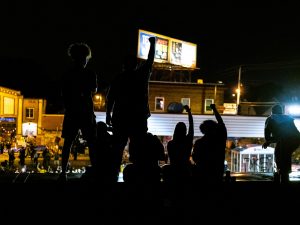‘Rain without thunder and lightening…’
The Atlantic
Why Minneapolis Was the Breaking Point
Black men and women are still dying across the country. The power that is American policing has conceded nothing.
Seventeen-year-old Darnella Frazier was on her way out the door to a Memorial Day bonfire on the other side of town when her 9-year-old cousin made a request: Would Frazier walk her to a nearby store? Of course, Frazier replied.
She and her cousin were on their way back home, at the corner of 38th and Chicago, just south of downtown, when Frazier spotted a distraught man sprawled on the pavement. A pile of police officers was holding him down. At least one of the cops seemed to be on top of the man’s neck.
Frazier pulled out her cellphone and hit Record.
Within hours, the whole world had seen the video: Minneapolis police officer Derek Chauvin driving his knee into the neck of 46-year-old George Floyd, not only until Floyd died but for minutes after his life had been extinguished. What came next was a national crisis.
When I first sat down to begin writing this story, parts of many American cities were on fire and police officers in dozens of places were committing indiscriminate acts of violence—unleashing tear gas, rubber bullets, and worse—against the citizenry they had sworn an oath to serve and protect. Elected officials were pleading for peace as parts of their cities burned and the nation, watching in real time on television, asked “Why?”
Decades earlier, there’d been the determined journalism of Ida B. Wells, whose Memphis newspaper was burned to the ground by white supremacists. Wells is best remembered for her crusading work in the 1890s, which not only documented the frequency of southern lynchings but also provided what we’d now consider data analysis in order to disprove the racist lie that lynchings were happening because black men had a particular lust for and inclination to rape white women. Less well known is that Wells also dispatched herself to the scene of cases of police violence, providing essential scrutiny of an equally American strand of homicidal impunity.
“Those who profess to favor freedom, and yet depreciate agitation, are men who want crops without plowing up the ground. They want the WESLEY LOWERY is a Pulitzer Prize–winning journalist and the author of They Can’t Kill Us All: Ferguson, Baltimore, and a New Era in America’s Racial Justice Movement. He is currently a correspondent for 60 in 6, a spin-off of 60 Minutes on the mobile app Quibi.” the former slave Frederick Douglass proclaimed in 1857. “They want the ocean without the awful roar of its many waters.”
“This struggle may be a moral one; or it may be a physical one; or it may be both moral and physical; but it must be a struggle,” Douglass continued, before arriving at a more widely quoted sentence: “Power concedes nothing without a demand.”
Racism is not to blame, the thinking popular among at least some conservatives goes. It’s the people fighting racism who are the problem. If everyone could just stop talking about all of this stuff, we could go “back” to being a peaceful, united country. No one seems to be able to answer when, precisely, in our history that previous moment of peace, justice, and racial harmony occurred.
WESLEY LOWERY is a Pulitzer Prize–winning journalist and the author of They Can’t Kill Us All: Ferguson, Baltimore, and a New Era in America’s Racial Justice Movement. He is currently a correspondent for 60 in 6, a spin-off of 60 Minutes on the mobile app Quibi.
[Full Article]

Leave a Reply